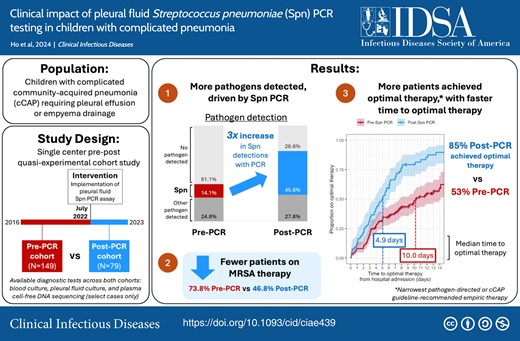-
Views
-
Cite
Cite
Erin C Ho, Kaitlin E Olson, Molly Butler, Meghan Birkholz, Kristen Miller, Christine E MacBrayne, Sarah Jung, Kevin Messacar, Edwin J Asturias, Samuel R Dominguez, Clinical Impact of Pleural Fluid Streptococcus pneumoniae Polymerase Chain Reaction Testing in Children With Complicated Pneumonia, Clinical Infectious Diseases, Volume 79, Issue 6, 15 December 2024, Pages 1487–1494, https://doi.org/10.1093/cid/ciae439
Close - Share Icon Share
Abstract
While Streptococcus pneumoniae (Spn) is the leading cause of pediatric complicated community-acquired pneumonia (cCAP), it is infrequently recovered by culture-based methods. We studied the real-world clinical impact of an Spn polymerase chain reaction (PCR) assay for pleural fluid.
This pre–post quasi-experimental cohort study compared pathogen detection, antibiotic usage, and outcomes in children hospitalized with cCAP requiring pleural effusion or empyema drainage at Children's Hospital Colorado between 2016 and 2023. Patients were compared across 2 diagnostic periods: pre-Spn PCR and post-Spn PCR. Cox proportional hazard models compared time from admission to pathogen detection, optimal therapy (narrowest pathogen-directed or guideline-recommended empiric therapy), and methicillin-resistant Staphylococcus aureus (MRSA) therapy discontinuation between periods.
Compared to the pre-Spn PCR cohort (n = 149), the post-Spn PCR cohort (n = 79) was more likely to have a pathogen detected (73.4% post-PCR vs 38.9% pre-PCR, P < .001), driven by more Spn detections (45.6% vs 14.1%, P < .001). Time to pathogen detection during hospitalization was shorter in the post-Spn PCR period (P < .001). The post-PCR cohort was more likely to receive optimal therapy (84.8% vs 53.0%, P < .001), with shorter median times to optimal antibiotics (4.9 vs 10.0 days, P < .001) and MRSA therapy discontinuation (1.5 vs 2.5 days, P = .03). There were no differences in hospital length of stay or readmissions.
Spn molecular testing of pleural fluid in children with cCAP resulted in significantly more microbiologic diagnoses and was associated with the optimization of antibiotics and decreased exposure to MRSA therapy, suggesting its clinical impact for pediatric complicated pneumonia.

This graphical abstract is also available at Tidbit: https://tidbitapp.io/tidbits/clinical-impact-of-pleural-fluid-streptococcus-pneumoniae-pcr-testing-in-children-with-complicated-pneumonia?utm_campaign=tidbitlinkshare&utm_source=ITP






